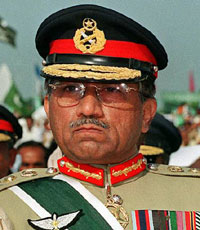Pakistan's opposition to boycott parliamentary elections
Pakistan’s opposition claim that forthcoming elections will be a simulation if Gen. Pervez Musharraf does not cancel the state of emergency and let people regain their rights. Some parties are going to put these elections under boycott.

Musharraf said Sunday he would stick to a January schedule for the polls, but set no time limit on emergency rule, which has resulted in the arrests of thousands of his critics, a ban on rallies and the blacking out of independent TV networks.
The measures, he argued, were necessary to ensure "absolutely fair and transparent elections."
Former Prime Minister Benazir Bhutto, speaking days after she was briefly put under house arrest, argued that it would make campaigning "difficult." Other opposition parties were more strident, saying Musharraf's sweeping powers would make a mockery of the democratic process.
Musharraf, who took power in a 1999 coup, appeared defiant but bitter at rising criticism of his decision to suspend the constitution just over a week ago, a step he says was necessary to combat rising Islamic militancy that had sown "turmoil, shock and confusion" in Pakistan.
"It was the most difficult decision I have ever taken in my life," Musharraf told his first news conference since declaring the emergency Nov. 3, voicing anger at those who questioned his commitment to democracy.
"I could have preserved myself, but then it would have damaged the nation. I found myself between a rock and a hard surface. I have no personal ego and ambitions to guard. I have the national interest foremost," he said, sitting on a dais at the grand presidential palace in Islamabad .
His defense was unlikely to dispel the notion shared by many in Pakistan that the emergency - launched ahead of a Supreme Court ruling that could have nixed his plans to serve another five-year term - was motivated by his own determination to stay in power.
Adding to their concerns was an announcement by the attorney-general Sunday that military courts could now try civilians on charges ranging from treason to inciting public unrest. That could, in theory, include those who organize protests against Musharraf's military-led government.
Bhutto said she was determined to go ahead with a 300-kilometer (185-mile) march from the eastern city of Lahore to the capital on Tuesday. Thousands of her supporters were expected to take part.
The United States and other Western allies have urged Musharraf to hold crucial parliamentary polls on schedule, and said they were pleased at news they would not be delayed. Earlier, the government said the vote could be pushed back by up to a year.
U.S. Secretary of State Condoleezza Rice expressed concern that Musharraf - considered a close ally in Washington 's so-called war on terror - had not set a time limit for restoring citizens' rights.
"It's not a perfect situation," she said, though two Democratic presidential hopefuls were more forceful.
Joe Biden, chairman of the Senate Foreign Relations Committee, said elections would be a "sham" without an end to the state of emergency. His rival, Bill Richardson, U.N. ambassador in the Clinton administration, said "you can't have democracy halfway."
Musharraf defended the dismissal of independent-minded Chief Justice Iftikhar Mohammed Chaudhry and many of his Supreme Court colleagues - who had emerged this year as the only real check on his power - as necessary for the government to function smoothly and fight Islamic militants.
He also declared the current parliament would be dissolved in the coming week, and that Pakistan would invite international observers to scrutinize the vote.
In refusing to commit to a date for lifting the emergency, he argued, it "contributes toward better law and order and a better fight against terrorism."
That drew sharp criticism from opposition parties.
Liaqat Baloch, secretary general of Pakistan's most popular Islamic party, Jamaat-e-Islami, said they were strongly considering boycotting the elections. "If there is an emergency and no constitution, it is impossible to have free and fair elections," he told The Associated Press.
Ameer ul-Azeem, spokesman for a broader coalition of hard-line parties, including the JI, said they would meet soon to decide whether to pull out of the polls and would appeal to Bhutto to join them to ensure the restoration of democracy.
Bhutto - who had been considering forming a pro-Western alliance with Musharraf before his emergency order - has yet to comment on what position her Pakistan People's Party would take.
Subscribe to Pravda.Ru Telegram channel, Facebook, RSS!


